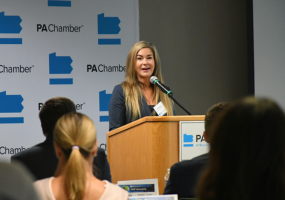 PA Chamber members convened in-person and online last week for key regulatory updates and insights from the executive director of the Pennsylvania Public Utility Commission at the PA Chamber’s fall DEP Quarterly meeting.
PA Chamber members convened in-person and online last week for key regulatory updates and insights from the executive director of the Pennsylvania Public Utility Commission at the PA Chamber’s fall DEP Quarterly meeting.
Following introductory remarks by Director of Government Affairs Amy Brinton, the Chamber’s new lead lobbyist on energy and environmental issues, and words of appreciation to and reflection from former PA Chamber Environmental Policy Council Chairman Brian Clark upon his retirement, PA PUC Executive Director Jennifer Berrier provided an update summarizing her first year at the agency.
Berrier told the audience that this past June, PA received a $4.6 million grant from the U.S. Department of Energy to internally bolster operations to enhance transmission expansion plan projects over the next two years. She also spoke of reforms to processes that are being considered by the agency, saying the PUC is working to increase transparency of applications and access to forms and documents, as well as working to provide resources for public input hearings, training for PUC staff, and expertise in FERC meetings.
Berrier said that 2023 brought about reforms based on public input, including the matter of practicing before the commission – i.e., non-attorney third party representation and allowing corporate officials to represent small businesses and partnerships in adversarial business before the PUC; streamlining the protest period from 60 to 30 days; petitions for emergency orders; and the ability to dismiss parties who fail to appear at hearings or conferences.
She also noted new rulemaking regarding hazardous liquids that will be published 60 days after publication and discussed two statutes that will be sunsetting –Chapter 14, Safeguards for PA Consumers; and Act 50 of 2017, aka the PA One Call Law. Before a Q&A with the audience, Berrier noted that the PUC is approaching its 90th anniversary and aims to continue to be a national leader. The snapshot of its five-year operational strategic plan includes a focus on modernization, people and culture, project management, technology, and more.
Following Berrier’s conversation, DEP Acting Executive Deputy Secretary Ramez Ziadeh provided an agency update that included a focus on the implementation of the Streamlined Permits for Economic Expansion and Development (SPEED) program that was enacted through the 2024-25 state budget. He shared insights about a staff augmentation program, which allows permit applicants to use external DEP approved qualified professionals for initial reviews of certain permits.
He also discussed the Qualified Professional Review Timeframe, which allows for shorter timeframes so that the permitting entity has enough time to review the qualified professional’s recommendation and process their final action within the established overall review timeframe; along with a tolling period, the time period commencing on the date that the permitting entity sends a deficiency letter and ending on the date the permitting entity receives the applicant’s response. He also discussed priority review, a heightened review timeframe in which a decision to issue or deny an eligible permit application shall be rendered within 10 business days of the expiration of the established review timeframe. By January 2025, Ziadeh said that DEP will establish an electronic tracking system which allows applicants to track the status of their applications.